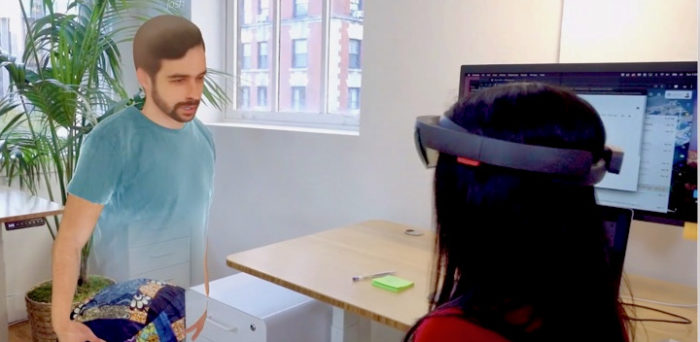
You can now join virtual meetings in any location and see avatars of coworkers or friends.
The VR and AR collaboration platform Spatial released a free AR app for iOS and Android last week. Instead of using a bulky and expensive VR headset, the platform now works with just a phone or tablet — though users can still use a headset, if they want.
The company claims its use has exploded up more than 130 times this year with over half a million meeting joins since the start of the year.

“Previously only people with a headset could experience the true magic of Spatial but we wanted anyone to be able to take advantage of it,” said CEO of Spatial Anand Agarawala, in a release.
“Now, you simply hold up your phone and for the first time ever can become an active part of any virtual meeting and see life-like avatars of coworkers or friends right in your living room,” he said.
Here’s an older video of how the platform works with an AR headset:
The new release of the platform includes several mobile-centered features. Automatic camera switching allows mobile users an easier view of who’s talking on a small screen and the mobile user interface allows your avatar to move and interact with models, documents, and videos in 3D.
Even though VR headset devices like the Oculus Quest 2 are predicted to sell millions of units this year, Spatial states that they can bring the app for free to billions of users on their phones.

“The phone is where AR will thrive first and we’re capitalizing on this trend today,” said Spatial CPO Jinha Lee in a statement. “We expect that some users will go on to a fully immersive headset experience as hardware continues to become more affordable for the mass market.”
Spatial claims this AR app offers the perfect gateway experience for people who want to try connecting more deeply with friends, family, and colleagues without having to invest in a VR headset, and that they have a broad section of users, including popstars interacting with fans, church groups, virtual plays, college students collaborating on projects, and more.

“People living in left-behind territories have traditionally inherited obsolete technology or nothing at all,” said deputy resident representative at UNDP Columbia, Alejandro Pacheco, in a statement.
“Leaving no one behind means making these most advanced tools available and usable to those who would otherwise lag even further behind,” he added.
- OpenAI’s new Point-E lets you generate 3D models with text - December 21, 2022
- Celebrity Cruises unveils virtual cruise experience - December 15, 2022
- Metaverse experiences could boost real world travel - December 12, 2022
